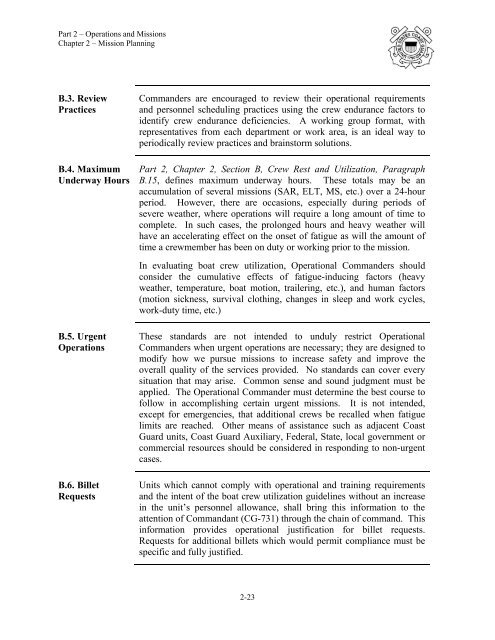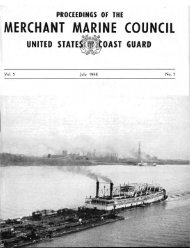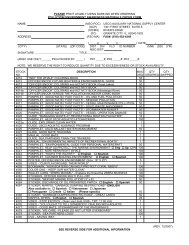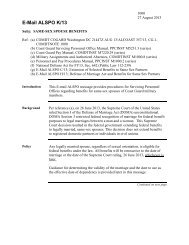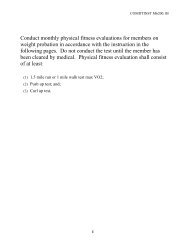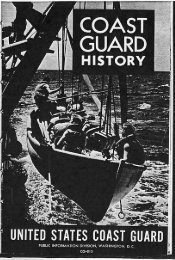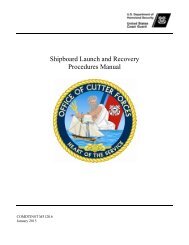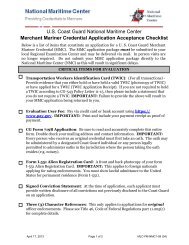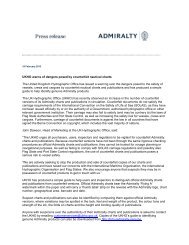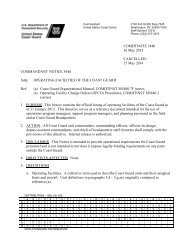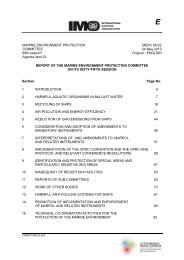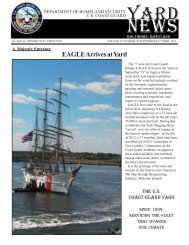- Page 1 and 2: U.S. Coast Guard Boat Operations an
- Page 3 and 4: COMDTINST M16114.32C Commandant Uni
- Page 5 and 6: COMDTINST M16114.32C pp. Auxiliary
- Page 7 and 8: COMDTINST M16114.32C l. Added guida
- Page 9 and 10: COMDTINST M16114.32C Record of Chan
- Page 11 and 12: U.S. Coast Guard Boat Operations an
- Page 13 and 14: U.S. Coast Guard Boat Operations an
- Page 15 and 16: U.S. Coast Guard Boat Operations an
- Page 17 and 18: U.S. Coast Guard Boat Operations an
- Page 19 and 20: U.S. Coast Guard Boat Operations an
- Page 21 and 22: U.S. Coast Guard Boat Operations an
- Page 23 and 24: U.S. Coast Guard Boat Operations an
- Page 25 and 26: U.S. Coast Guard Boat Operations an
- Page 27 and 28: U.S. Coast Guard Boat Operations an
- Page 29 and 30: Part 2 - Operations and Missions CH
- Page 31 and 32: Part 2 - Operations and Missions Ch
- Page 33 and 34: Part 2 - Operations and Missions Ch
- Page 35 and 36: Part 2 - Operations and Missions Ch
- Page 37 and 38: Part 2 - Operations and Missions Ch
- Page 39 and 40: Part 2 - Operations and Missions Ch
- Page 41 and 42: Part 2 - Operations and Missions Ch
- Page 43 and 44: Part 2 - Operations and Missions Ch
- Page 45 and 46: Part 2 - Operations and Missions Ch
- Page 47: Part 2 - Operations and Missions Ch
- Page 51 and 52: Part 2 - Operations and Missions Ch
- Page 53 and 54: Part 2 - Operations and Missions Ch
- Page 55 and 56: Part 2 - Operations and Missions Ch
- Page 57 and 58: Part 2 - Operations and Missions Ch
- Page 59 and 60: Part 2 - Operations and Missions Ch
- Page 61 and 62: Part 2 - Operations and Missions Ch
- Page 63 and 64: Part 2 - Operations and Missions Ch
- Page 65 and 66: Part 2 - Operations and Missions Ch
- Page 67 and 68: Part 2 - Operations and Missions Ch
- Page 69 and 70: Part 2 - Operations and Missions Ch
- Page 71 and 72: Part 2 - Operations and Missions Ch
- Page 73 and 74: Part 2 - Operations and Missions Ch
- Page 75 and 76: Part 2 - Operations and Missions Ch
- Page 77 and 78: Part 2 - Operations and Missions Ch
- Page 79 and 80: Part 2 - Operations and Missions Ch
- Page 81 and 82: Part 2 - Operations and Missions Ch
- Page 83 and 84: Part 2 - Operations and Missions Ch
- Page 85 and 86: Part 2 - Operations and Missions Ch
- Page 87 and 88: Part 2 - Operations and Missions Ch
- Page 89 and 90: Part 2 - Operations and Missions Ch
- Page 91 and 92: Part 2 - Operations and Missions Ch
- Page 93 and 94: Part 2 - Operations and Missions Ch
- Page 95 and 96: Part 2 - Operations and Missions Ch
- Page 97 and 98: Part 2 - Operations and Missions Ch
- Page 99 and 100:
Part 2 - Operations and Missions Ch
- Page 101 and 102:
Part 2 - Operations and Missions Ch
- Page 103 and 104:
Part 2 - Operations and Missions Ch
- Page 105 and 106:
Part 2 - Operations and Missions Ch
- Page 107 and 108:
Part 2 - Operations and Missions Ch
- Page 109 and 110:
Part 2 - Operations and Missions Ch
- Page 111 and 112:
Part 2 - Operations and Missions CH
- Page 113 and 114:
Part 2 - Operations and Missions Ch
- Page 115 and 116:
Part 2 - Operations and Missions Ch
- Page 117 and 118:
Part 2 - Operations and Missions Ch
- Page 119 and 120:
Part 2 - Operations and Missions Ch
- Page 121 and 122:
Part 2 - Operations and Missions Ch
- Page 123 and 124:
Part 2 - Operations and Missions Ch
- Page 125 and 126:
Part 2 - Operations and Missions Ch
- Page 127 and 128:
Part 2 - Operations and Missions Ch
- Page 129 and 130:
Part 2 - Operations and Missions Ch
- Page 131 and 132:
Part 2 - Operations and Missions Ch
- Page 133 and 134:
Part 2 - Operations and Missions Ch
- Page 135 and 136:
Part 2 - Operations and Missions Ch
- Page 137 and 138:
Part 2 - Operations and Missions Ch
- Page 139 and 140:
Part 2 - Operations and Missions Ch
- Page 141 and 142:
Part 2 - Operations and Missions Ch
- Page 143 and 144:
Part 2 - Operations and Missions Ch
- Page 145 and 146:
Part 2 - Operations and Missions Ch
- Page 147 and 148:
Part 2 - Operations and Missions Ch
- Page 149 and 150:
Part 2 - Operations and Missions Ch
- Page 151 and 152:
Part 2 - Operations and Missions Ch
- Page 153 and 154:
Part 2 - Operations and Missions Ch
- Page 155 and 156:
Part 2 - Operations and Missions Ch
- Page 157 and 158:
Part 2 - Operations and Missions Ch
- Page 159 and 160:
Part 2 - Operations and Missions Ch
- Page 161 and 162:
Part 2 - Operations and Missions CH
- Page 163 and 164:
Part 2 - Operations and Missions Ch
- Page 165 and 166:
Part 2 - Operations and Missions Ch
- Page 167 and 168:
Part 2 - Operations and Missions Ch
- Page 169 and 170:
Part 2 - Operations and Missions Ch
- Page 171 and 172:
Part 2 - Operations and Missions Ch
- Page 173 and 174:
U.S. Coast Guard Boat Operations an
- Page 175 and 176:
Part 3 - Station Operations CHAPTER
- Page 177 and 178:
Part 3 - Station Operations Chapter
- Page 179 and 180:
Part 3 - Station Operations Chapter
- Page 181 and 182:
Part 3 - Station Operations Chapter
- Page 183 and 184:
Part 3 - Station Operations Chapter
- Page 185 and 186:
Part 3 - Station Operations Chapter
- Page 187 and 188:
Part 3 - Station Operations Chapter
- Page 189 and 190:
Part 3 - Station Operations Chapter
- Page 191 and 192:
Part 3 - Station Operations Chapter
- Page 193 and 194:
Part 3 - Station Operations Chapter
- Page 195 and 196:
Part 3 - Station Operations Chapter
- Page 197 and 198:
Part 3 - Station Operations Chapter
- Page 199 and 200:
Part 3 - Station Operations Chapter
- Page 201 and 202:
Part 3 - Station Operations Chapter
- Page 203 and 204:
Part 3 - Station Operations Chapter
- Page 205 and 206:
Part 3 - Station Operations Chapter
- Page 207 and 208:
Part 3 - Station Operations Chapter
- Page 209 and 210:
Part 3 - Station Operations Chapter
- Page 211 and 212:
Part 3 - Station Operations Chapter
- Page 213 and 214:
Part 3 - Station Operations Chapter
- Page 215 and 216:
Part 3 - Station Operations Chapter
- Page 217 and 218:
Part 3 - Station Operations Chapter
- Page 219 and 220:
Part 3 - Station Operations Chapter
- Page 221 and 222:
Part 3 - Station Operations Chapter
- Page 223 and 224:
Part 3 - Station Operations Chapter
- Page 225 and 226:
Part 3 - Station Operations Chapter
- Page 227 and 228:
Part 3 - Station Operations Chapter
- Page 229 and 230:
Part 3 - Station Operations Chapter
- Page 231 and 232:
Part 3 - Station Operations Chapter
- Page 233 and 234:
Part 3 - Station Operations Chapter
- Page 235 and 236:
Part 3 - Station Operations Chapter
- Page 237 and 238:
Part 3 - Station Operations Chapter
- Page 239 and 240:
Part 3 - Station Operations Chapter
- Page 241 and 242:
Part 3 - Station Operations Chapter
- Page 243 and 244:
Part 3 - Station Operations Chapter
- Page 245 and 246:
Part 3 - Station Operations Chapter
- Page 247 and 248:
Part 3 - Station Operations Chapter
- Page 249 and 250:
Part 3 - Station Operations Chapter
- Page 251 and 252:
Part 3 - Station Operations Chapter
- Page 253 and 254:
Part 3 - Station Operations Chapter
- Page 255 and 256:
Part 3 - Station Operations Chapter
- Page 257 and 258:
Part 3 - Station Operations Chapter
- Page 259 and 260:
Part 3 - Station Operations Chapter
- Page 261 and 262:
Part 3 - Station Operations Chapter
- Page 263 and 264:
Part 3 - Station Operations CHAPTER
- Page 265 and 266:
Part 3 - Station Operations Chapter
- Page 267 and 268:
Part 3 - Aids to Navigation Team Op
- Page 269 and 270:
Part 3 - Aids to Navigation Team Op
- Page 271 and 272:
Part 3 - Aids to Navigation Team Op
- Page 273 and 274:
Part 3 - Aids to Navigation Team Op
- Page 275 and 276:
Part 3 - Aids to Navigation Team Op
- Page 277 and 278:
Part 3 - Aids to Navigation Team Op
- Page 279 and 280:
Part 3 - Aids to Navigation Team Op
- Page 281 and 282:
Part 3 - Aids to Navigation Team Op
- Page 283 and 284:
U.S. Coast Guard Boat Operations an
- Page 285 and 286:
U.S. Coast Guard Boat Operations an
- Page 287 and 288:
Part 4- Training Chapter 1 - Traini
- Page 289 and 290:
Part 4- Training Chapter 1 - Traini
- Page 291 and 292:
Part 4- Training Chapter 1 - Traini
- Page 293 and 294:
Part 4- Training Chapter 1 - Traini
- Page 295 and 296:
Part 4- Training Chapter 1 - Traini
- Page 297 and 298:
Part 4- Training Chapter 1 - Traini
- Page 299 and 300:
Part 4- Training Chapter 1 - Traini
- Page 301 and 302:
Part 4- Training Chapter 1 - Traini
- Page 303 and 304:
Part 4- Training Chapter 1 - Traini
- Page 305 and 306:
Part 4- Training Chapter 1 - Traini
- Page 307 and 308:
Part 4- Training Chapter 1 - Traini
- Page 309 and 310:
Part 4- Training Chapter 1 - Traini
- Page 311 and 312:
Part 4- Training Chapter 1 - Traini
- Page 313 and 314:
Part 4- Training Chapter 1 - Traini
- Page 315 and 316:
Part 4- Training Chapter 1 - Traini
- Page 317 and 318:
Part 4- Training Chapter 1 - Traini
- Page 319 and 320:
Part 4- Training Chapter 1 - Traini
- Page 321 and 322:
Part 4- Training Chapter 3 - System
- Page 323 and 324:
Part 4- Training Chapter 3 - System
- Page 325 and 326:
Part 4- Training Chapter 3 - System
- Page 327 and 328:
Part 4- Training Chapter 3 - System
- Page 329 and 330:
Part 4- Training Chapter 3 - System
- Page 331 and 332:
Part 4- Training Chapter 3 - System
- Page 333 and 334:
Part 4- Training Chapter 3 - System
- Page 335 and 336:
Part 4- Training Chapter 3 - System
- Page 337 and 338:
Part 4- Training Chapter 3 - System
- Page 339 and 340:
Part 4- Training Chapter 3 - System
- Page 341 and 342:
Part 4- Training Chapter 3 - System
- Page 343 and 344:
Part 4- Training Chapter 3 - System
- Page 345 and 346:
Part 4- Training Chapter 3 - System
- Page 347 and 348:
Part 4- Training CHAPTER 4 Qualific
- Page 349 and 350:
Part 4 - Training Chapter 4 - Quali
- Page 351 and 352:
Part 4 - Training Chapter 4 - Quali
- Page 353 and 354:
Part 4- Training Chapter 4 - Qualif
- Page 355 and 356:
Part 4- Training Chapter 4 - Qualif
- Page 357 and 358:
Part 4- Training Chapter 4 - Qualif
- Page 359 and 360:
Part 4- Training CHAPTER 5 Certific
- Page 361 and 362:
Part 4- Training Chapter 5 - Certif
- Page 363 and 364:
Part 4- Training Chapter 5 - Certif
- Page 365 and 366:
Part 4- Training Chapter 5 - Certif
- Page 367 and 368:
Part 4- Training Chapter 5 - Certif
- Page 369 and 370:
Part 4- Training Chapter 5 - Certif
- Page 371 and 372:
Part 4- Training Chapter 5 - Certif
- Page 373 and 374:
Part 4- Training Chapter 5 - Certif
- Page 375 and 376:
Part 4- Training CHAPTER 6 Currency
- Page 377 and 378:
Part 4- Training Chapter 6 - Curren
- Page 379 and 380:
Part 4- Training Chapter 6 - Curren
- Page 381 and 382:
Part 4- Training Chapter 6 - Curren
- Page 383 and 384:
Part 4- Training Chapter 6 - Curren
- Page 385 and 386:
Part 4- Training Chapter 6 - Curren
- Page 387 and 388:
Part 4- Training Chapter 6 - Curren
- Page 389 and 390:
Part 4- Training Chapter 6 - Curren
- Page 391 and 392:
Part 4- Training Chapter 6 - Curren
- Page 393 and 394:
Part 4- Training Chapter 6 - Curren
- Page 395 and 396:
Part 4- Training CHAPTER 7 Document
- Page 397 and 398:
Part 4- Training Chapter 7 - Docume
- Page 399 and 400:
Part 4- Training Chapter 7 - Docume
- Page 401 and 402:
Part 4- Training Chapter 7 - Docume
- Page 403 and 404:
U.S. Coast Guard Boat Operations an
- Page 405 and 406:
Part 5 - Readiness and Standardizat
- Page 407 and 408:
Part 5 - Readiness and Standardizat
- Page 409 and 410:
Part 5 - Readiness and Standardizat
- Page 411 and 412:
Part 5 - Readiness and Standardizat
- Page 413 and 414:
Part 5 - Readiness and Standardizat
- Page 415 and 416:
Part 5 - Readiness and Standardizat
- Page 417 and 418:
Part 5 - Readiness and Standardizat
- Page 419 and 420:
Part 5 - Readiness and Standardizat
- Page 421 and 422:
Part 5 - Readiness and Standardizat
- Page 423 and 424:
Part 5 - Readiness and Standardizat
- Page 425 and 426:
Part 5 - Readiness and Standardizat
- Page 427 and 428:
Part 5 - Readiness and Standardizat
- Page 429 and 430:
Part 5 - Readiness and Standardizat
- Page 431 and 432:
Part 5 - Readiness and Standardizat
- Page 433 and 434:
Part 5 - Readiness and Standardizat
- Page 435 and 436:
Part 5 - Readiness and Standardizat
- Page 437 and 438:
Part 5 - Readiness and Standardizat
- Page 439 and 440:
Part 5 - Readiness and Standardizat
- Page 441 and 442:
Part 5 - Readiness and Standardizat
- Page 443 and 444:
Part 5 - Readiness and Standardizat
- Page 445 and 446:
Part 5 - Readiness and Standardizat
- Page 447 and 448:
Part 5 - Readiness and Standardizat
- Page 449 and 450:
Part 5 - Readiness and Standardizat
- Page 451 and 452:
Part 5 - Readiness and Standardizat
- Page 453 and 454:
Part 5 - Readiness and Standardizat
- Page 455 and 456:
Part 5 - Readiness and Standardizat
- Page 457 and 458:
Part 5 - Readiness and Standardizat
- Page 459 and 460:
Part 5 - Readiness and Standardizat
- Page 461 and 462:
Appendix A - Unit and RFO Aids to N
- Page 463 and 464:
Appendix A - Unit and RFO Aids to N
- Page 465 and 466:
Appendix A - Unit and RFO Aids to N
- Page 467 and 468:
Appendix A - Unit and RFO Aids to N
- Page 469 and 470:
Appendix A - Unit and RFO Aids to N
- Page 471 and 472:
Appendix B - Department of Defense
- Page 473 and 474:
Appendix B - Department of Defense
- Page 475 and 476:
Appendix C - Glossary APPENDIX C Gl
- Page 477 and 478:
Appendix C - Glossary Certain Dange
- Page 479 and 480:
Appendix C - Glossary Engineering C
- Page 481 and 482:
Appendix C - Glossary Night Non-Com
- Page 483 and 484:
Appendix C - Glossary Standardizati
- Page 485 and 486:
Appendix D - Acronyms APPENDIX D Ac
- Page 487 and 488:
Appendix D - Acronyms ACRONYM DOG D
- Page 489 and 490:
Appendix D - Acronyms ACRONYM PMS P
- Page 491 and 492:
Index Index Aids to Navigation Team


